导学案unit10
- 格式:docx
- 大小:124.76 KB
- 文档页数:10
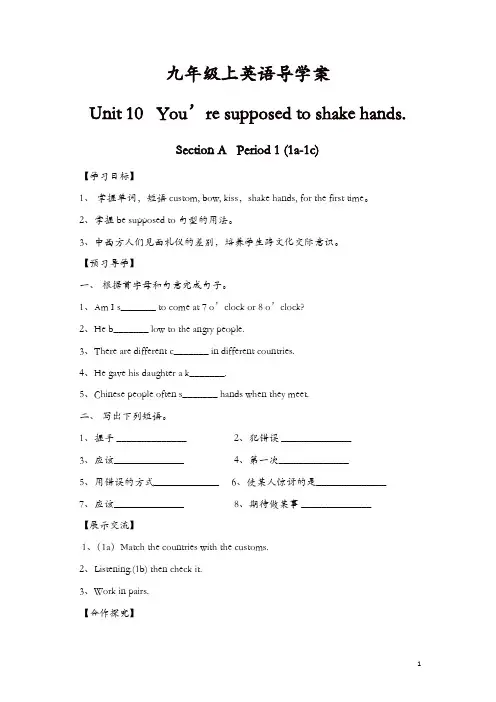
九年级上英语导学案Unit 10 You’re supposed to shake hands.Section A Period 1 (1a-1c)【学习目标】1、掌握单词,短语custom, bow, kiss,shake hands, for the first time。
2、掌握be supposed to句型的用法。
3、中西方人们见面礼仪的差别,培养学生跨文化交际意识。
【预习导学】一、根据首字母和句意完成句子。
1、Am I s_______ to come at 7 o’clock or 8 o’clock?2、He b_______ low to the angry people.3、There are different c_______ in different countries.4、He gave his daughter a k_______.5、Chinese people often s_______ hands when they meet.二、写出下列短语。
1、握手 ______________2、犯错误 ______________3、应该______________4、第一次______________5、用错误的方式_____________6、使某人惊讶的是______________7、应该______________8、期待做某事 ______________ 【展示交流】1、(1a)Match the countries with the customs.2、Listening.(1b) then check it.3、Work in pairs.【合作探究】“be supposed to”的用法1. be supposed to do sth. “应该做某事”, 某人被期望做某事,主语通常是人, 相当于be expected to do sth.或情态动词should,时态、人称和句式的变化在be上体现,to为不定式符号,后接动词原形。
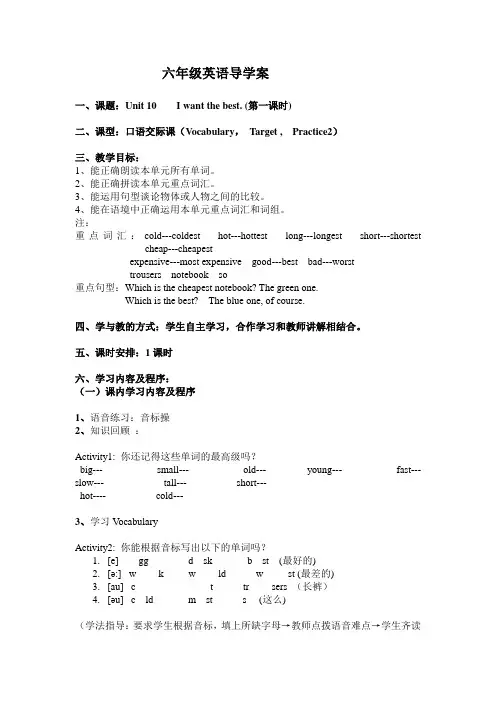
六年级英语导学案一、课题:Unit 10 I want the best. (第一课时)二、课型:口语交际课(Vocabulary,Target , Practice2)三、教学目标:1、能正确朗读本单元所有单词。
2、能正确拼读本单元重点词汇。
3、能运用句型谈论物体或人物之间的比较。
4、能在语境中正确运用本单元重点词汇和词组。
注:重点词汇:cold---coldest hot---hottest long---longest short---shortest cheap---cheapestexpensive---most expensive good---best bad---worsttrousers notebook so重点句型:Which is the cheapest notebook? The green one.Which is the best? The blue one, of course.四、学与教的方式:学生自主学习,合作学习和教师讲解相结合。
五、课时安排:1课时六、学习内容及程序:(一)课内学习内容及程序1、语音练习:音标操2、知识回顾:Activity1: 你还记得这些单词的最高级吗?big--- small--- old--- young--- fast--- slow--- tall--- short---hot---- cold---3、学习V ocabularyActivity2: 你能根据音标写出以下的单词吗?1.[e] __gg d__sk b__st (最好的)2.[ə:] w__ __k w__ __ld w__ __ st (最差的)3.[au] c__ __ __ __t tr__ __sers (长裤)4.[əu] c__ld m__st s__ (这么)(学法指导:要求学生根据音标,填上所缺字母→教师点拨语音难点→学生齐读→打开课本第54页,听录音跟读→学生齐读→小组内自由读→检查个别学生朗读情况)进一步小结形容词最高级的形式。
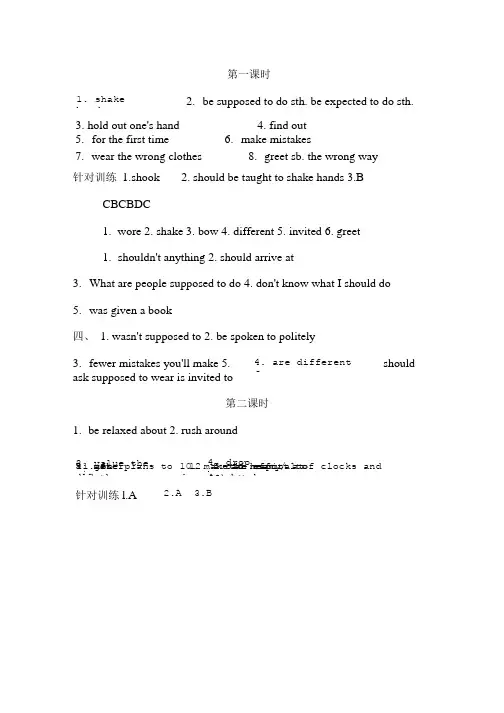
4. are different from ours3. value the time4. drop by5. make plans to do sth. the capital of clocks and watches 7. after all 8. at noon / at night 9. get mad 10. make an effort to do sth. 11. on time 12. avoid heavy traffic针对训练l.A2.A3.B 1. shake hands第一课时2. be supposed to do sth. be expected to do sth.5. for the first time6. make mistakes7. wear the wrong clothes8. greet sb. the wrong way针对训练 1.shook2. should be taught to shake hands3.BCBCBDC1. wore2. shake3. bow4. different5. invited6. greet 1. shouldn't anything 2. should arrive at3. What are people supposed to do4. don't know what I should do5. was given a book四、 1. wasn't supposed to 2. be spoken to politely3. fewer mistakes you'll make 5. shouldask supposed to wear is invited to第二课时1. be relaxed about2. rush around3. hold out one's hand4. find out四、1. watches 2. made 3.friends'4. together5.towards6.valuenoon 第三课时1. bring the passport clean the chalk off the blackboardpack warm clothes in the meeting room5. take off6. social situations7. table manners 8. be worth the trouble针对训练l.C1. mind your manners eat with one's handsCBBAB二、 1. reach 2. wore 3. calling 4. relaxed 5. met三、1. where I can 2. It is a good place to hang out3.are supposed to4. used to be5. do you feel about/think of2.supposed to smoke hereADBDA二、1. very impolite to keep others waiting 2. helpful to learn as many as possible3.go abroad , important to try to understand how people think4.worth the trouble want to understand another culture better5.important to be on time三、BDBAC, CACBB四、CDDDC第四课时3. stick the chopsticks into the food4. an empty bowl5. point at someone with your chopsticks6. starteating first针对训练BBB 、DBBCB二、 1. impolite 2. stick 3. After 4. expected 5.pointed三、 1. supposed to 2. without saying 3. taught herself4. Whose e-mail receive5. aren't supposed四、 1. is expected toeating first2. pick up3. Japanese for first4. are supposed to with your hands5. dirty clothes to wash第五课时1. basic table manners2. go out of one's way to do sth.3. make sb. feel at homebe comfortable doing sth.5. be different from be / get used to doing sth. be full 8. at firstmake mistakesbe excited about13. show up11. give sb. some suggestions / advice 12. look forward to doing sth.14. knock on / at the door15. make sb. mad/angry针对训练 1. B 2. B 3. C 4. except 5. except 6. besides一、1. suggestions 2. knocking 3. basic 4. behave 5. except二、1. to remember 2. laughing 3. used 4. suggestions5.meeting6. driving7. turning8. visiting三、CBCBBB四、1 .from 2. supposed 3. on 4. with 5. It 6. That 7. about8.put 9. it 10. get五、1. goes out of her way 2. no reason(s)3.Besides Japanese4. challenge behavefortable speaking French6.still make lots of mistakes, worry me like it used to。
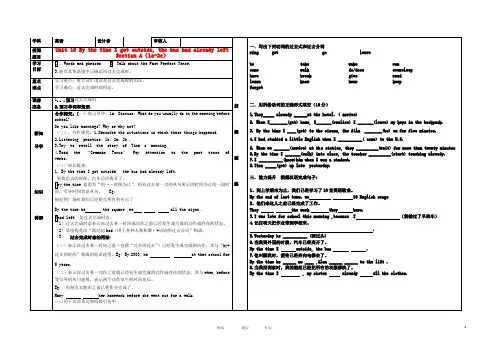
学科英语设计者审核人技能演练一.写出下列动词的过去式和过去分词ring get go leavebe take wake runcome walk do/does oversleephave break give readlearn know hear keepforget二.用所给动词的正确形式填空(10分)1.They_____ already ______at the hotel. ( arrive)2. When I________(get) home, I_______(realize) I _______(leave) my keys in the backpack.3. By the time I ____(get) to the cinema, the film ________(be) on for five minutes.4.I had studied a little English when I ___________( come) to the U.S.5. When we _______(arrive) at th e station, they __________(wait) for more than twenty minutes6.By the time I _______(walk) into class, the teacher __________(start) teaching already.7.I ___________(know)him when I was a student.8.Tina _____(get) up late yesterday.三.能力提升根据汉语完成句子:1、到上学期末为止,我们已经学习了10首英语歌曲。
By the end of last term,we 10 English songs2、他们来这儿之前已经完成了工作。
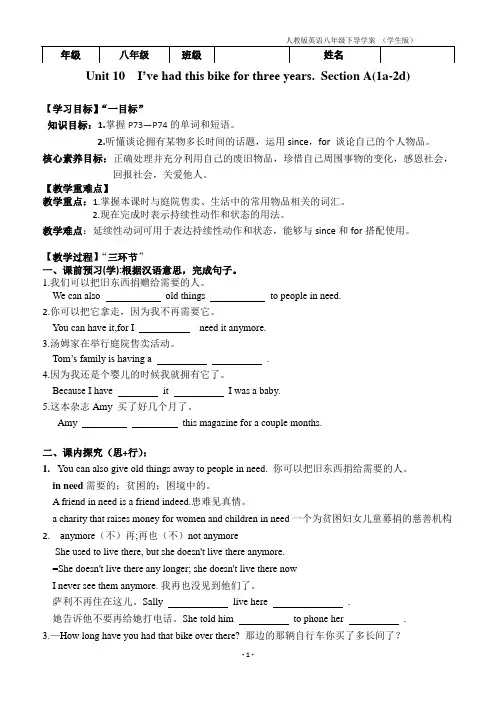
Unit 10 I’ve had this bike for three years.Section A(1a-2d)【学习目标】“一目标”知识目标:1.掌握P73—P74的单词和短语。
2.听懂谈论拥有某物多长时间的话题,运用since,for 谈论自己的个人物品。
核心素养目标:正确处理并充分利用自己的废旧物品,珍惜自己周围事物的变化,感恩社会,回报社会,关爱他人。
【教学重难点】教学重点:1.掌握本课时与庭院售卖、生活中的常用物品相关的词汇。
2.现在完成时表示持续性动作和状态的用法。
教学难点:延续性动词可用于表达持续性动作和状态,能够与since和for搭配使用。
【教学过程】“三环节”一、课前预习(学):根据汉语意思,完成句子。
1.我们可以把旧东西捐赠给需要的人。
We can also old things to people in need.2.你可以把它拿走,因为我不再需要它。
You can have it,for I need it anymore.3.汤姆家在举行庭院售卖活动。
Tom’s family is having a .4.因为我还是个婴儿的时候我就拥有它了。
Because I have it I was a baby.5.这本杂志Amy 买了好几个月了。
Amy this magazine for a couple months.二、课内探究(思+行):1.You can also give old things away to people in need. 你可以把旧东西捐给需要的人。
in need需要的;贫困的;困境中的。
A friend in need is a friend indeed.患难见真情。
a charity that raises money for women and children in need一个为贫困妇女儿童募捐的慈善机构2. a nymore(不)再;再也(不)not anymoreShe used to live there, but she doesn't live there anymore.=She doesn't live there any longer; she doesn't live there nowI never see them anymore. 我再也没见到他们了。
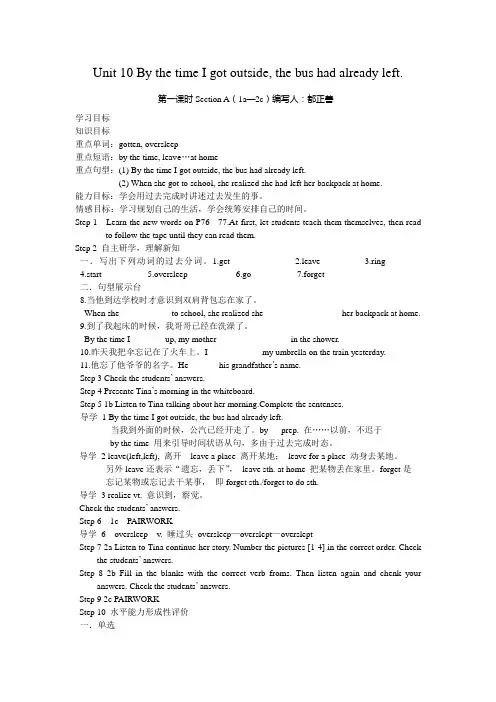
Unit 10 By the time I got outside, the bus had already left.第一课时Section A(1a—2c)编写人:都正善学习目标知识目标重点单词:gotten, oversleep重点短语:by the time, leav e…at home重点句型:(1) By the time I got outside, the bus had already left.(2) When she got to school, she realized she had left her backpack at home.能力目标:学会用过去完成时讲述过去发生的事。
情感目标:学习规划自己的生活,学会统筹安排自己的时间。
Step 1 Learn the new words on P76---77.At first, let students teach them themselves, then read to follow the tape until they can read them.Step 2 自主研学,理解新知一.写出下列动词的过去分词。
1.get ________ 2.leave _________3.ring _______ 4.start ________ 5.oversleep________ 6.go ________ 7.forget______二.句型展示台8.当他到达学校时才意识到双肩背包忘在家了。
When she ___________ to school, she realized she _________________ her backpack at home.9.到了我起床的时候,我哥哥已经在洗澡了。
By the time I _______ up, my mother ________________ in the shower.10.昨天我把伞忘记在了火车上。
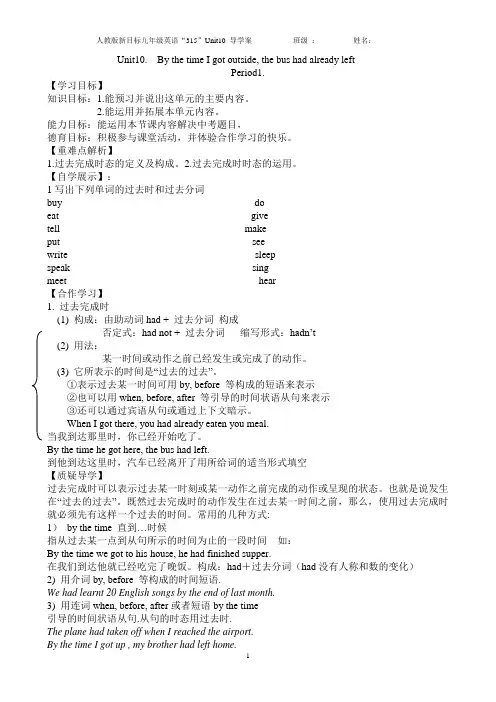
Unit10. By the time I got outside, the bus had already leftPeriod1.【学习目标】知识目标:1.能预习并说出这单元的主要内容。
2.能运用并拓展本单元内容。
能力目标:能运用本节课内容解决中考题目,德育目标:积极参与课堂活动,并体验合作学习的快乐。
【重难点解析】1.过去完成时态的定义及构成。
2.过去完成时时态的运用。
【自学展示】:1写出下列单词的过去时和过去分词buy________ ____________ do___________ ____________eat__________ __________ give _________ __________tell __________ ________ make___________ __________put___________ ________ see_________ ______________write_______ __________ sleep____________ __________speak_________ _________ sing___________ ___________meet_______ _________ hear____________ __________【合作学习】1. 过去完成时(1) 构成:由助动词had + 过去分词构成否定式:had not + 过去分词缩写形式:hadn’t(2) 用法:某一时间或动作之前已经发生或完成了的动作。
(3) 它所表示的时间是―过去的过去‖。
①表示过去某一时间可用by, before 等构成的短语来表示②也可以用when, before, after 等引导的时间状语从句来表示③还可以通过宾语从句或通过上下文暗示。
When I got there, you had already eaten you meal.当我到达那里时,你已经开始吃了。
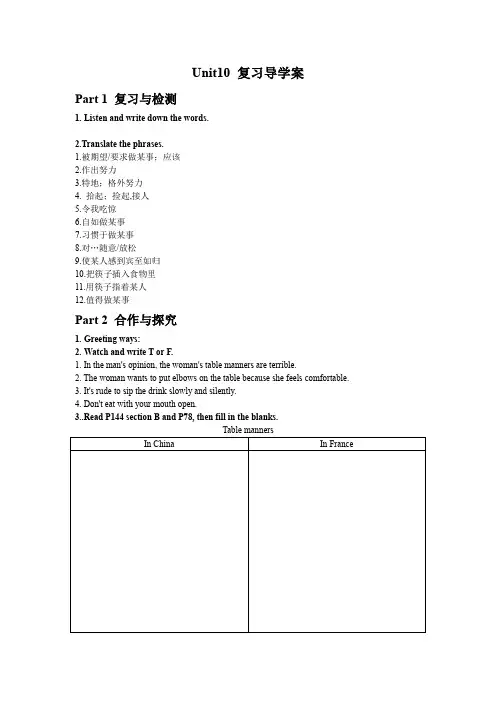
Unit10 复习导学案Part 1 复习与检测1.Listen and write down the words.2.Translate the phrases.1.被期望/要求做某事;应该2.作出努力3.特地;格外努力4. 拾起;捡起,接人5.令我吃惊6.自如做某事7.习惯于做某事8.对…随意/放松9.使某人感到宾至如归10.把筷子插入食物里11.用筷子指着某人12.值得做某事Part 2 合作与探究1.Greeting ways:2.Watch and write T or F.1. In the man's opinion, the woman's table manners are terrible.2. The woman wants to put elbows on the table because she feels comfortable.3. It's rude to sip the drink slowly and silently.4. Don't eat with your mouth open.3..Read P144 section B and P78, then fill in the blanks.Table mannersIn China In FrancePart 3 能力与提升1.Say sth to yourself or others.2.Read and choose the best answers.Some British and American people like to invite friends for a meal at home. You should not be upset if your English friends don't invite you home. It doesn't mean they don't like you.Dinner parties usually start between 7 and 8 p.m. and end at about 11. Ask your hosts what time you should arrive. It's polite to bring flowers, chocolates or a bottle of wine as a gift.Usually the evening starts with drinks and snacks. If you want to be extra polite, say how much you like the room, or the pictures on the wall. But remember—it's not polite to ask how much things cost.You'll probably start the meal with soup or something small, then you'll have meat or fish with vegetables, and then dessert, followed by coffee. It's polite to finish everything on your plate and to take more if you want it.Did you enjoy the evening? Call your hosts the next day, or write them a short “thank you”letter. British and American people like to say “thank you, thank you, thank you”all the time!1. If your English friend doesn't invite you to dinner at home, it means he or she______ . A.doesn't like you B.likes you C.is too busy2.It's impolite_________.A.to ask about the price of a certain thingB.to say “thank you”to hostsC.take nothing with you when you are invited to dinner3.The meal ends with_________usually.A.soupB.coffeeC.meat or fish4.When you are invited to a dinner party, you'd better_________ .A.ask what time you should arriveB.take your wife with youC.drink as more as possible3.Homework.Write a letter to your pen pal to give him/her advice and suggestions on how to behave properly in China.有关文化礼仪的写作常用句型You’re (not) supposed to….You are expected to…It’s polite/impolite to…It’s important to…You should….。
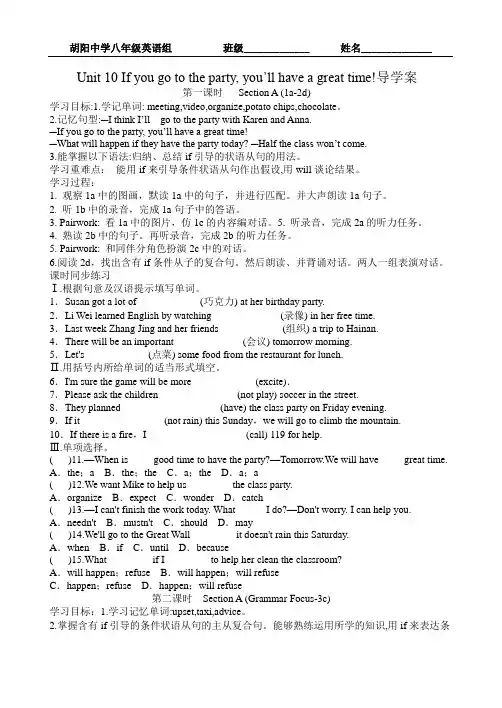
Unit 10 If you go to the party, you’ll have a great time!导学案第一课时Section A (1a-2d)学习目标:1.学记单词: meeting,video,organize,potato chips,chocolate。
2.记忆句型:─I think I’ll go to the party with Karen and Anna.─If you go to the party, you’ll have a great time!─What will happen if they have the party today? ─Half the class won’t come.3.能掌握以下语法:归纳、总结if引导的状语从句的用法。
学习重难点:能用if来引导条件状语从句作出假设,用will谈论结果。
学习过程:1. 观察1a中的图画,默读1a中的句子,并进行匹配。
并大声朗读1a句子。
2. 听1b中的录音,完成1a句子中的答语。
3. Pairwork: 看1a中的图片,仿1c的内容编对话。
5. 听录音,完成2a的听力任务。
4. 熟读2b中的句子。
再听录音,完成2b的听力任务。
5. Pairwork: 和同伴分角色扮演2c中的对话。
6.阅读2d,找出含有if条件从子的复合句。
然后朗读、并背诵对话。
两人一组表演对话。
课时同步练习Ⅰ.根据句意及汉语提示填写单词。
1.Susan got a lot of ____________(巧克力) at her birthday party.2.Li Wei learned English by watching _____________(录像) in her free time.3.Last week Zhang Jing and her friends ____________(组织) a trip to Hainan.4.There will be an important _____________(会议) tomorrow morning.5.Let's ____________(点菜) some food from the restaurant for lunch.Ⅱ.用括号内所给单词的适当形式填空。
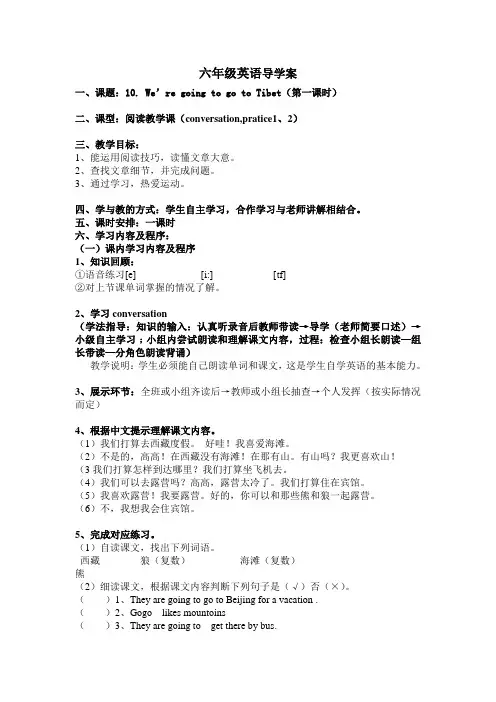
六年级英语导学案一、课题:10. We’re going to go to Tibet(第一课时)二、课型:阅读教学课(conversation,pratice1、2)三、教学目标:1、能运用阅读技巧,读懂文章大意。
2、查找文章细节,并完成问题。
3、通过学习,热爱运动。
四、学与教的方式:学生自主学习,合作学习与老师讲解相结合。
五、课时安排:一课时六、学习内容及程序:(一)课内学习内容及程序1、知识回顾:①语音练习[e] [i:] [tf]②对上节课单词掌握的情况了解。
2、学习conversation(学法指导:知识的输入:认真听录音后教师带读→导学(老师简要口述)→小级自主学习﹔小组内尝试朗读和理解课文内容,过程:检查小组长朗读—组长带读—分角色朗读背诵)教学说明:学生必须能自己朗读单词和课文,这是学生自学英语的基本能力。
3、展示环节:全班或小组齐读后→教师或小组长抽查→个人发挥(按实际情况而定)4、根据中文提示理解课文内容。
(1)我们打算去西藏度假。
好哇!我喜爱海滩。
(2)不是的,高高!在西藏没有海滩!在那有山。
有山吗?我更喜欢山!(3我们打算怎样到达哪里?我们打算坐飞机去。
(4)我们可以去露营吗?高高,露营太冷了。
我们打算住在宾馆。
(5)我喜欢露营!我要露营。
好的,你可以和那些熊和狼一起露营。
(6)不,我想我会住宾馆。
5、完成对应练习。
(1)自读课文,找出下列词语。
西藏狼(复数)海滩(复数)熊(2)细读课文,根据课文内容判断下列句子是(√)否(×)。
()1、They are going to go to Beijing for a vacation .()2、Gogo likes mountoins()3、They are going to get there by bus.()4、They are going to go tcamping.()5、There are no beaches in Tibet.(3)、完成翻译句子。
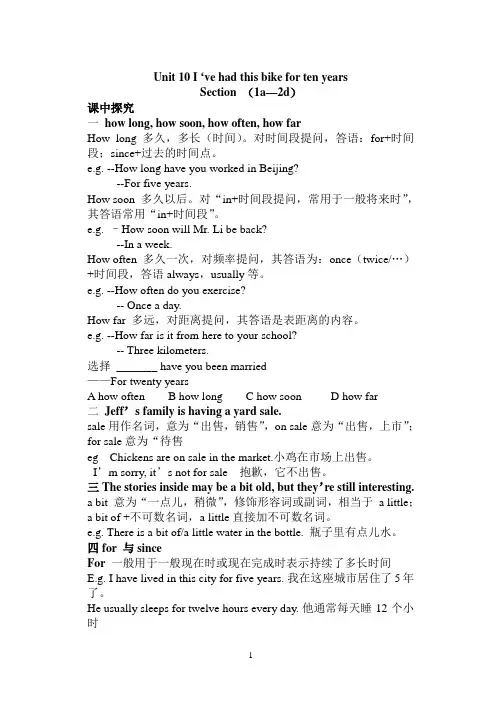
Unit 10 I ‘ve had this bike for ten yearsSection (1a—2d)课中探究一how long, how soon, how often, how farHow long 多久,多长(时间)。
对时间段提问,答语:for+时间段;since+过去的时间点。
e.g. --How long have you worked in Beijing?--For five years.How soon 多久以后。
对“in+时间段提问,常用于一般将来时”,其答语常用“in+时间段”。
e.g. –How soon will Mr. Li be back?--In a week.How often 多久一次,对频率提问,其答语为:once(twice/…)+时间段,答语always,usually等。
e.g. --How often do you exercise?-- Once a day.How far 多远,对距离提问,其答语是表距离的内容。
e.g. --How far is it from here to your school?-- Three kilometers.选择_______ have you been married——For twenty yearsA how oftenB how longC how soonD how far二Jeff’s family is having a yard sale.sale用作名词,意为“出售,销售”,on sale意为“出售,上市”;for sale意为“待售eg Chickens are on sale in the market.小鸡在市场上出售。
I’m sorry, it’s not for sale 抱歉,它不出售。
三The stories inside may be a bit old, but they’re still interesting.a bit 意为“一点儿,稍微”,修饰形容词或副词,相当于a little;a bit of +不可数名词,a little直接加不可数名词。
Unit 10 It’s a nice day, isn’t it?第一课时(Section A 1a----2c)一、学习目标:1、学习反意疑问句的用法2、能够通过练习熟练掌握和运用反意疑问句进行闲聊的表达法二、自主预习:翻译下列短语和句子:在公交车上_______________,迟到_______________,看起来像_______________,忘记我的雨伞_______________,去游泳_______________,到中午的时候_______________,在周末_______________,15路公共汽车_______________,1、他的确很出色,对吗?他的确是!_________________________________________2、今天的确多风,不是吗?是的,它是。
_________________________________________3、看起来要下雨,不是吗?是的,它是。
_________________________________________4、你是本的妹妹,对吗?是的,我是。
_________________________________________三、知识点导学:知识点一:He sure is!他确实这样!Sure的用法:(1)在句中是副词,相当于口语中表示说话人较有把握的肯定回答,意为“的确;当然;确实;一定”等,相当于Certainly或Yes常放在动词前。
Eg: It sure is cold night.的确是个个寒冷的夜晚。
eg:----He can succeed.----他会成功的。
----Sure!----当然!(2)sure还可作形容词,意为“有把握的、确信的”常用于下列结构: be sure to do sth.表示“(确信)一定能做某事”。
be sure of sth.表示“对某事有把握”。
Unit 10If you go to the party, you will have a great time!第一课时Section A 1a2c【学习目标】1. 语言知识目标:1) Key words and phrases:meeting, video, organize, potato chips, chocolate, upset, taxi, advice, half the class, make some food2) Key sentences:①I think I will take the bus to the party.If you do so, you will be late.②I think I will go to the party with Karen and Anna.If you do ,you will have a great time.③When is the good to have the party? Let’s have it today.④If we have it today, half the class won’t e.2. 能力目标:用if从句谈论事情发展的结果3. 情感目标:客观、理性地分析学习和生活中地问题,找出解决方法【学习重难点】1.If引导地条件状语从句 2.含有if从句地特殊疑问句S tep1导:Step2 学:(学)自学教材1a)①I think I will .......If you do, you’ll....②What will happen if they have the party today?If they have it today, half the class won’t e.自学要求:姿势端正,零抬头,零发呆,认真研读课本。
Step3测展:1a)、1b) 口展Step4议展:1c) 对议口展:所议内容Step5测展:2a)、2b) 口展:问答形式Step6议展:2c) 口展:所议内容Step7评:知识点一:1、在含if条件状语从句地复合句中,主句为以下情况之一的,条件状语从句用一般现在时。
Unit 10 You’re supposed to shake hands(第1课时)一、教学目标: 1. 语言知识目标:1) 能掌握以下单词: custom, bow, kiss, greet, be supposed to, 2)掌握be supposed to句型的用法。
2. 情感态度价值观目标:1. 学习一些见面礼仪,生活习俗和对时间的看法。
2. 了解西方国家的风土人情和习俗。
二、教学重难点1. 教学重点:be supposed to的用法2. 教学难点:中西方人们见面礼仪的差别。
培养学生跨文化交际意识。
三、自主梳理1. 短语1)握手2)习俗3)鞠躬4)arrive at 5)make mistakes 6)一…就2.先猜测再认真听1b录音, 完成1a.根据图片练习对话。
3.看2a右边的插图和左边的句子,仔细听录音内容,判断玛丽娅做错了什么。
4.根据2a的内容,再听录音完成2b。
四、合作探究升华学科能力,透析重难点(一)对话练习1.根据所学知识把不同国家第一次见面礼仪列出来,仿照1c进行对话练习。
2.小组合作完成2d的对话训练。
进行2a,2b 听力训练(二)语言点探究1.for the first time eg.当我第一次看到他时,他正在看书._____________________.拓展:1)第二次_____________ 2)有关time的短语____________________.2.shake的用法:过去式shook过去分词shaken现在分词_________握手_____________和某人握手:shake hands with sb /shake one's hands 或shake sb by the handsEg.他和我握手了__ ______________________________________3.bow的用法:向某人鞠躬/低头可表示为:bow to sb.Eg.不要向失败(failure)低头__________________4. 辩一辨:be supposed to 与shouldbe supposed是suppose一词的_______语态结构。
Unit 10 I’m going to be a basketball player.【学习目标】1、学会7个单词(grow, programmer, engineer, pilot, professional, act, move)及2个短语( grow up, computer science )会读并会写。
2、熟练运用句型-What are you going to be……?-I'm going to be ……谈论将来意向,运用句型-How are you going……?--I'm going to …….谈论实现方式。
3、通过对职业的讨论,树立自己的人生理想。
【学习内容】Unit 10 I’m going to be a basketball player.SectionA 1a—2c【学习重难点】重点:1、学会7个单词(grow, programmer, engineer, pilot, professional, act, move)及2个短语( grow up, computer science )2 、学会运用-What are you going to be when you grow up?-I'm going to be a basketball player.-How are you going to do that?-I'm going to practice basketball every day..难点:学会准确表达-What are you going to be when you grow up?-I'm going to be a basketball player.-How are you going to do that?-I'm going to practice basketball every day..-I’m going to take acting lessons.【知识链接】学会运用(一般将来时)描绘自己的人生理想和表达奋斗的想法【学法指导】小组展示,师生互动,生生互动,小组采访【学习流程】task 1. 自主学习通过自学能写出下列有关职业名词:程序师___________工程师____________飞行员_____________教师______演员__________职业篮球运动员_____________电脑程序员______________短语:学习计算机科学_______________每天练习篮球______________努力学习数学_________________学习表演课程_________________Task 2. 探究学习1.听力练习:看1b,听录音,连线:computer programmer take acting lessonsprofessional basketball player study computer scienceengineer practice basketball every dayactor study math raelly hard2、学习谈论将来意向及实现方式“be going to+动词原形"表示计划、打算要做或即将发生的事,be有人称和数的变化。
人教版八年级下 unit10 导学案 (人教版英语八年级)【知识点】1. in need “需要;需求”A friend in need is a friend indeed.患难见真情【拓展】in danger “在危险中”Many kinds of animals are ____________.许多种动物正处于灭绝的危险中。
in trouble “在困境中”.He is in trouble ____________ (do) his homework.他做作业有些困难。
2. no longer “不在;不复”She could ____________ find a way to get into the valley.她再也找不到进山谷的路了。
【拓展】no more “不在;不复”,与 no longer同义,多数可以通用,也可写成not ...any moreThe baby ___________ cried.或The boy cried no more.那个男孩不在哭了。
not ... any longer 与no longer 同义She could ___________ find a way to get into the valley. =She could not find a way to get intothe valley ____________.她再也找不到进山谷的路了。
3. sweet adj. “甜蜜的;甜的;含糖的”Most girls have a sweet tooth.大多数女孩子都爱吃甜食。
4. memory n. C “记忆;回忆”I have a very poor memory.我的记性很差。
5. a bit “稍微;有点儿” 可修饰动词形容词副词The speaker spoke up _______ so as to make himself heard more clearly.演讲者把嗓门提高了一点儿,以便使别人听得更清楚。
兰河一中导学案年级七年学科英语教者柯海英课题Unit 10 Where did you go on vacation?课型新授课课时1教学时间2012.5.281. 让学生学会表达自己在假期所进行的活动.学2. 使学生了解与假期相关的活动 .习3. 学习本课的知识点 .目词汇 : New York City, camp, summer camp, museum.标句型 :-Where did you go on vacation? She went to the mountains.4. 训练学生在听录音时听懂简单英语句型的能力.学习词汇: New York City, camp, summer camp, museum.重难点句型 :-Where did you go on vacation? She went to the mountains本节课是在九单元的基础上继续学习及运用一般过去时, 学生要重点掌握一般过去时的结构, 注意主语后动词的变化 .自:认真学习本节课的重点短语及句型1.夏令营2.去山里学参观博物馆 4.去海滩3.5.去纽约市指看望我的叔叔6.7.你假期去哪儿了 ?导我呆在家里了.1. 学生谈论平时假期中大家都在做什么?Eg,A: What do you usually do on vacaton?B:I usually go to Harbin. What about you ?C:I usually go to HainanD:自2. 学生通过教材 1a 中的英语短语 , 两人一组进行对话 : Eg ,Where did you go on vacation?主I went to New York City.3. 学生注意观察教材中 1a 中 a,b,c,d,e 中人物所从事的活动动 , 为听学力 1b 作准备 .4 . 两人一组或小组间进行本节课的相关的对话, 学生之间在设置问题时习要注意主语人称的变化.Eg, Where did your father go on vacation?He went to the beach.作任务 :(task)合各组小组长充当记者, 采访本组成员在假期中去哪儿了. 列一个表 , 把采访人员名字列在表格里, 然后形成一个报告, 在全班同学面前进行汇报:作 Egname Where did he/she go on vacation?探Li Hongzhuang Visited his uncle究Last vacation, Li Hongzhuang visited his unmcle.兰河一中导学案Ⅰ .写出下列动词的过去式1.stay2.go3.visit4.swim5.study6.have7.fly8.break9.do10.rain11.help12.lose13.make14.walk15.decide16.eat17.am/is18.areⅡ你假期去哪儿了?达Where did you go on vacation?标测1.I2.She.试3.He.4.I.Ⅲ .依照例句改写下列句子A.e.g.He went to the Central Park.( 变否定句 ,一般疑问句及回答),→He didn’tgo to the Central Park.Did he go to the Central Park?Yes,he did./No,he didn ’t.1.She visited her uncle.2.We studied for exams last week.达3.They went to the movies yesterday.标Ⅲ .汉译英测1.她假期去看她叔叔了。
She her uncle her vacation.试was.2.今天天气很凉爽。
Today the3.我们在为语文考试而学习。
We for Chinese.作完成课时点拨训练第一课时所有题业课后反思兰河一中导学案年级七年学科英语教者柯海英课题Unit 10Where did you go on vacation?课型新授课课时第2课时教学时间2012.5.281. 让学生学会表达对假期的感。
学2. 使学生了解与假期相关的的活动。
习 3. 词汇: guide central didn’ t really rainy were fantastic目句型: Where did you go on vacation? I went to New York City标4. 训练学生在听录音时听懂简单英语句型的能力。
让学生学会评价与假期相关的活动。
词汇: guide central didn’t really rainy were fantastic学习句型:Where did you go on vacation?重难点I went to Central Park.How was your vacation? It was pretty good.这节课听力内容比较多,因此学生在预习时要注意2a,2b 表格中的内容,把表格中的内容汉语弄清楚。
go to Central Park_______________ play volleyball______________自study for exams__________________ go to the movies_____________(1)一般过去时的疑问句的构成结构(主语后动词是实义动词的):学_______ + 主语 +__________? 肯定回答与否定回答(以he 为例):Yes,_____ ______ .No, _____________.指(2) 特殊疑问句的构成结构(主语后动词是实义动词的):由特殊疑问词 +did + 语 +___________?导Eg, Where did he go on vacation?(3)注意系动词在过去时中的变化:was ; were;什么时候用was: 当主语为第一人称I 和_____________ 时用 was;Were:当主语为第二人称you 和 ______________用 were;2a, 学生注意黑体字的汉语意思:Where did Nancy,Kevin and Julie go on vacation?注意表格中peopl与place下面的词2b 中 go to the Central Park. Study for exams的汉语意思熟悉好三个人名右侧对应的动词短语,看他们是否做了这些事情,是填在 Yes 的那栏里 , 还是填在 No 的那栏里。
学生自已根据 2b 表格里的内容编对话。
自 Eg,A: Nancy, Where did you go on vacation?B; I went to New York City.主A:Oh, really, Did you go to Central Park?B:Yes, I did.学学生注意总结60 页语法总结部分,看他们体现出一般过去时的构成;总结:习注意 3a 用 was, were填空时注意主语人称。
用 3b 中的四幅图片进行对话:eg, How was the bus trip?It was relaxing.同组同学进行合组写一篇小短文,——My vacation合要在文中体现出地点、时间、天气、所做活动、食物以及感受等;每个同学写一个,然后本组内最好的一个进行汇报:作My vacationLast summer vacation. I went to探究兰河一中导学案一.按要求写出单词(10 分)1.rain(形容词 ) ____________2.beach(复数 )_____________3.friendly(反义词 ____________4.go(过去式)____________5.expensive(反义词 ) __________6.photo(复数 ) ____________7. study( 单三 )____________8.my(名词性物主代词 )________9.find( 过去式 )____________10.visit( 现在分词 ) ___________达二.单词1.Why did you s________ at home?2.There was not too much to see, the museum was b___________.3.The vacation was r_________ , I feel great.标4.Where did you go? I v__________ a museum.5.She studied for the e__________ yesterday.6.It was r________ , so we had to stay at home.7.My friends w___________ free last weekend.测8.The pants are too e__________, I can’ t afford them.9.The fried fish is very d___________.10.There were many people on the bus, and it’ s c___________.11.The dog didn’ t let me in. It was u_________ to me.试12.I didn ’ t have any m_______ for a taxi, so I walked back to the hotel.13.We had great fun __________(play) football.14.Jim decided ____________(go) to Shanghai.15.How was the food on the plate? It was a__________.16.Mary found her brother ___________(sit) in the corner.17.Let me help you __________(find) him.18.Her story made us _________(feel) sad.19.The girl’ s doll was lost. She was _________(happy).()1.Today we _________ the Great Wall, I think it’ s great.A. visitsB. to visitC. visitingD. visited()st Sunday we went to the beach . We had great fun __________ inthe water.达B. playsC. playD. to playA. playing()3.It ________ rainy and windy on April 10th , I stayed at home all day.标B. wasC. areD. wereA. is()4.What did the foreigners _________ their vacation?测B. think forC. think overD. think ofA. think ofas试)5.My mother and I _________ at my home _________ that snowy (night.A. were, atB. was, atC. were, onD. was , on作完成点拨课时训练的第二课时10 单元单词每个写 5 遍业课后反思兰河一中导学案年级七年学科英语教者柯海英课题Unit 10 Where did you go on vacation? Section B课型新授课课时第3课时教学时间2012.5.291. 让学生学会表达对假期的感受学2. 全党生熟练掌握一般过去时的问句习3. 学习本课的知识点: delicious,expensive,crowded,cheap,think of目Where did you go? I went to New York City.标4. 训练学生在听录音时听懂简单句型的能力。